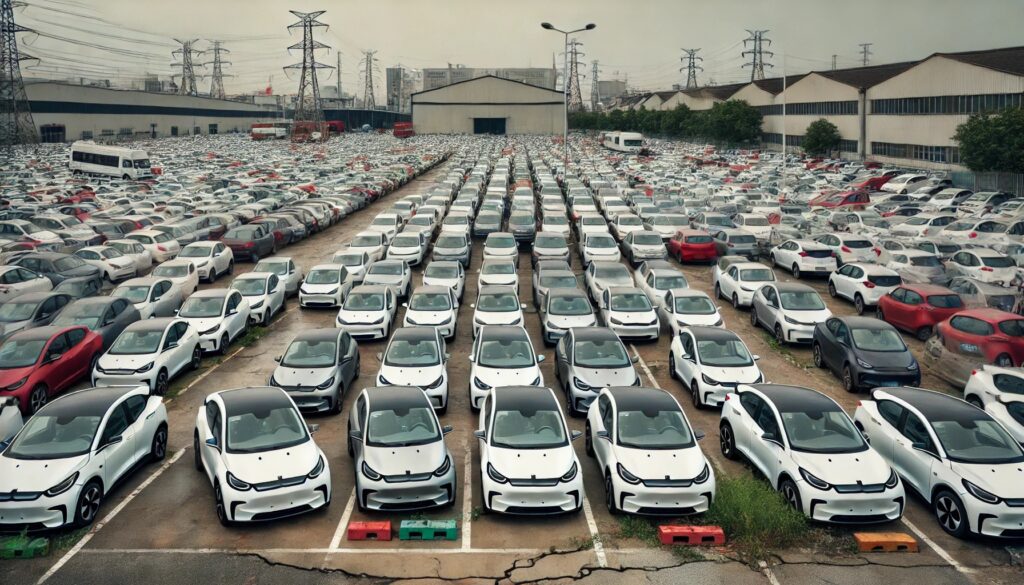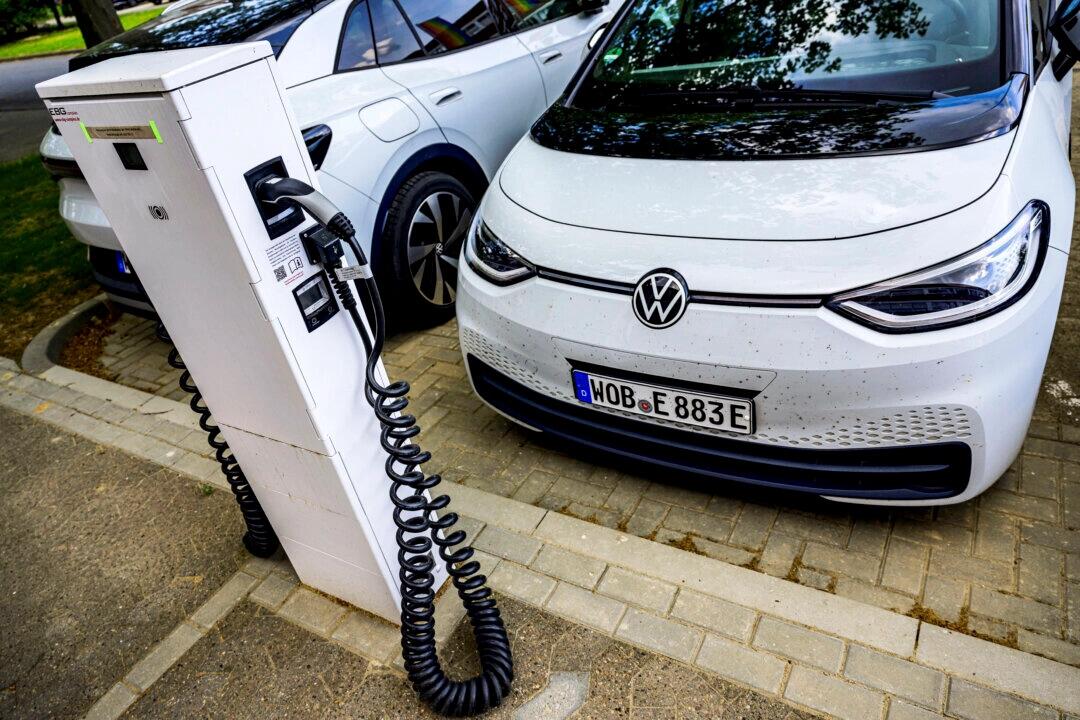91% of German e-car dealerships see current order situation as “poor” or “very poor” for the year.
.
Politicians in Germany had been racing to eliminate fossil fuel cars and replace them with e-cars. But then the technical and economic realities began to sink in – especially among private consumers, who are turning their backs on them in droves!
.
They should have listened to real science instead of all the activist funded rubbish.
.
 https://blackout-news.de/wp-content/uploads/2024/08/xElektroautos-H... 300w, https://blackout-news.de/wp-content/uploads/2024/08/xElektroautos-H... 768w, https://blackout-news.de/wp-content/uploads/2024/08/xElektroautos-H... 1536w, https://blackout-news.de/wp-content/uploads/2024/08/xElektroautos-H... 1792w" alt="Deutlicher Rückgang bei Nachfrage nach Elektroautos in Deutschland. Privatkunden bestellen in der ersten Jahreshälfte 47 % weniger E-Autos." width="616" height="352" />
https://blackout-news.de/wp-content/uploads/2024/08/xElektroautos-H... 300w, https://blackout-news.de/wp-content/uploads/2024/08/xElektroautos-H... 768w, https://blackout-news.de/wp-content/uploads/2024/08/xElektroautos-H... 1536w, https://blackout-news.de/wp-content/uploads/2024/08/xElektroautos-H... 1792w" alt="Deutlicher Rückgang bei Nachfrage nach Elektroautos in Deutschland. Privatkunden bestellen in der ersten Jahreshälfte 47 % weniger E-Autos." width="616" height="352" />
.
Sharp drop in demand for electric cars in Germany. Private customers order 47% fewer e-cars in the first half of the year. Image: AI-generated by Blackout News.
Hat-tip: Blackout News
.
“Germans (and UK drivers) are becoming increasingly skeptical about EVs.
Current figures from car dealerships reveal an escalation in rejection,” reports ‘Welt‘.
Especially private customers are rejecting e-vehicles.
Hybrid cars are also seeing a massive drop, with sales plummeting 37% over the same period.
.
“Dealerships are not expecting any improvement for the second half of the year,” reports ‘Welt‘.
“Of the car dealerships surveyed, 91% rate the order situation among private customers for pure EVs as ‘poor’ or ‘very poor’ for the year as a whole.”
Meanwhile petrol and diesel engine car sales have risen 24% and 20%, respectively.
.
Buyers have become turned off by the lousy national charging infrastructure, range limitations and high costs.
.
Moreover, many consumers have begun to understand that EVs are not that green, on a mine to landfill basis, and pose their own set of environmental challenges.
Owning an EV offers very NO financial benefits, because they have much higher costs than anticipated
Affordability, Charging-Infrastructure, & Range-Anxiety Continue To Keep Americans From Embracing EVs
https://www.windtaskforce.org/profiles/blogs/affordability-charging...
BY TYLER DURDEN
While the US and the EU look at different ways to add tariffs to China-made electric vehicles to prevent supply disruption, the reality is, overall demand for EVs is starting to peak.
Such was the topic of a new FT report that looked into why Americans aren't buying more electric vehicles.
“It’s just not accessible to us at this point in our life,” one couple told FT, who said they were looking for a more affordable vehicle.
They went with a $19,000 Honda Accord after a trade-in, since only five new EV models under $40,000 have hit the market in 2024, the report says.
A number of factors have decreased buying of EVs, including among environmentally conscious consumers. Various sources, including FT reported about the following issues:
1) high EV prices (increase monthly lease payments),
2) high financing interest rates (increase monthly lease payments),
3) short driving range,
4) lack of charging infrastructure,
5) high insurance cost,
6) high on-the-road charging cost
7) time wasted sitting in vehicle while charging; it takes 5 minutes to fill a gas tank to get about 500 miles of driving, but it take at least 1 to 2 hours to fast-charge a EV battery to get 250 miles of driving
That waste is enormous, if you multiply that time by millions of EVs charged per day.
That waste will make the US worker less productive, further lower his standard of living.
8) high repair and bodyshop cost, and long times for bodyshops to get parts
9) very low resale/trade-in value,
10) low-range during hot and cold weather, especially with a few passengers and some luggage
11) more rapid wear of tires and brakes and expensive replacement cost
12) spending at least "$15000 + labor + hazardous landfill charge" to replace an EV battery in an 8-y-old car
13) worrying about having enough charge, and where to charge, when making a longer trip from A to B
14) worrying about the battery catching fire, while parked in the garage, or on the road
15) inability for an EV to tow almost anything for some distance, without having to recharge along the way
.
Everett Eissenstat, a former senior US Trade Representative told FT: “There is no question, this list of woes is an explanation of the very slow EV adoption in the US and in Europe. We are just not producing EVs consumers need at prices plus other costs, they can afford”. That meager result is after more than 10 years of high subsidies, and Media hype.
Nearly Half Of US EV Drivers Consider Switching Back To Gas Vehicles: McKinsey Study
.
More electric vehicle drivers are thinking about switching back to internal combustion engine automobiles, according to new findings from the 2024 McKinsey & Co. Mobility Consumer Global Survey.
.

.
Globally, the survey of 30,000 respondents in 15 countries found that at least 29 percent of EV owners are likely to go back to driving gas-powered cars.
Australia topped the list with 49 percent confirming they want to return to driving behind the wheel of an gas-powered automobile, the study found.
.
The lack of public charging infrastructure was the chief reason respondents wanted to switch back to gas-powered vehicles, with 35 percent saying it is “not yet good enough for me.”
Go Woke, Go Broke: Ford Announces Mind-Boggling $100,000 Loss on Each EV Sold in 2024
https://www.windtaskforce.org/profiles/blogs/go-woke-go-broke-ford-...
.
Ford’s attempt to electrify its revenue through EV production has been a swing and a miss.
In response to the decreasing market for EVs, Ford has begun cutting orders from its battery suppliers, according to Bloomberg.
.
Even though this changeup could be beneficial in the long run, Ford will not come out of its EV experiment unscathed.
Sources told Bloomberg Ford lost over $100,000 per EV in the first quarter of 2024, more than double its deficit from last year.
.
The news comes as the EV market across the country has taken a hit in 2024.
The Associated Press reported last month, sales of EVs grew only 3.3% during the first quarter of 2024, a sharp decrease from the 47% growth seen last year.
.
The EV share of total U.S. sales also fell from 7.6% to 7.15%, year-to-year fourth qtr.
Regular car sales were down as well.
.
The declining sales numbers support automakers’ mistake, they believed their own hype, and moved too fast expanding their EV production, the AP reported.
Trending:
Biden Gets Desperate, Will Use Capitol Police Against Trump in New ...
.
Given the state of the EV market, Ford is trying to reinvent its EV strategy.
Ford has decided to reduce its spending on battery-powered models by $12 billion, Bloomberg reported.
Ford’s has already forecast it will lose up to $5.5 billion from EVs alone this year.
,
Bloomberg reported, Ford CEO Jim Farley recently said, Ford’s EV division, known as Model e, “is the main drag on the whole company right now.”
"The company has taken several measures to try and remain competitive with the EV market king, Tesla.
“We’ve seen prices coming down quite dramatically and that’s why we haven’t been able to keep up from a cost reduction standpoint,” Ford’s CFO John Lawler told analysts April 24 on the company’s earnings call, according to Bloomberg.
“But we’re targeting to take out as much cost this year as we can on Model e"
You need to be a member of Citizens' Task Force on Wind Power - Maine to add comments!
Join Citizens' Task Force on Wind Power - Maine